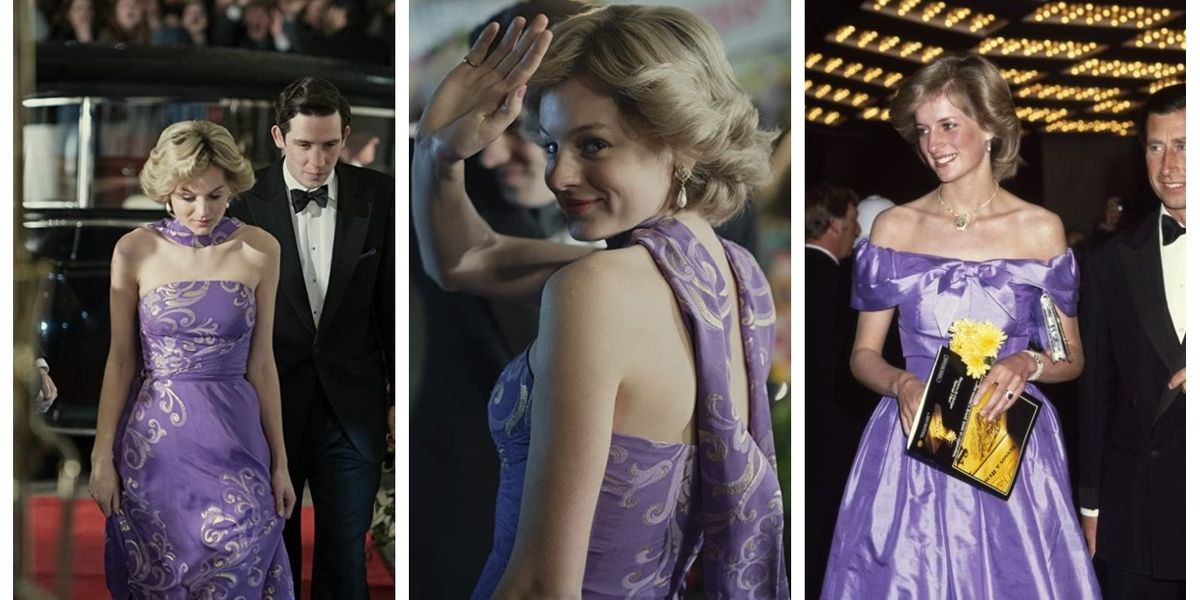
In his controversial eulogy for his sister Diana, Earl Spencer blamed the princess’s death on the paparazzi.
“It is a point to remember that of all the ironies about Diana, perhaps the greatest was this—a girl given the name of the ancient goddess of hunting was, in the end, the most hunted person of the modern age,” he said.
It is another great irony that decades after her death, Diana’s story remains a point of almost compulsive fascination for the public, and her innermost struggles and private agonies are the subjects of three new high-profile media events.
Season 4 of The Crown sees Diana, played by a magnetic Emma Corrin, take center stage. The documentary Diana: In Her Own Words, which was released in 2017, has been given the top spot on Netflix’s homepage, perhaps intended to cater to Diana fans left hungry after The Crown.
Kristen Stewart, who was recently cited as today’s James Dean, is set to play Diana in a movie called Spencer, which will detail her split from Prince Charles. Save any major missteps, the combination of Stewart’s and Diana Spencer’s star power is sure to create legions of new Diana devotees.
Diana and Kristen Stewarttodaydewspost.com
The Crown and Diana: In Her Own Words (and in all likelihood, Spencer) spare few details of Diana’s troubled life. As many of us know by now, the woman who at first appeared to be living a fairytale viewed herself as a “sacrificial lamb” sent to slaughter on her wedding day.
From the beginning of her relationship to Prince Charles, she felt tortured by his relationship with Camilla (whom he always loved and would eventually marry) and overwhelmed by the relentless commitments of royal life. Stalked and abused by paparazzi, she suffered from chronic bulimia that began the week after her engagement to Charles as well as morning sickness, depression, and feelings of perpetual alienation.
Seeing Emma Corrin’s Diana twirl and dazzle by day, then retch and self-harm at night, makes for addictive television; it’s almost possible to forget that her story, in all its devastating drama, isn’t theatre.
But there is a strange dissonance when watching Diana: In Her Own Words, in which Diana (literally in her own words) spends a lot of time questioning and lamenting the public’s endless idealization of her.
Exclusive Sneak Peek | Diana: In Her Own Words
www.youtube.com
Diana never understood the public’s obsession with her, and she probably would not believe that it has endured this long. By compulsively telling and retelling her story, lavishing attention on her outfits and her mental illnesses, are the media and the public not making some of the same mistakes they did during Diana’s life, turning her private world into fodder for publicity, for movies, books, papers, and articles (like this one)?
Of course, modern paparazzi can no longer physically stalk Diana. And in Diana: In Her Own Words, the then-princess expresses a deep desire to be seen, to connect, to be understood, and to express herself and her pain. She voluntarily completed the series of secret interviews that would comprise Andrew Morton’s bestselling book and later this documentary. She exposed her suicide attempts and marital dissatisfaction to the public with complete awareness that this information would make headlines across the world.
After she broke from the Royal Family, told her story, and abandoned the illusion of perfection, she did appear to be healing, leaning into her humanitarian work and taking new lovers. She played a crucial role in fighting stigma about HIV/AIDS and traveled around the world bringing joy and empathy to the masses.
Princess Diana’s Brother Speaks Out About The Crown: ‘A Lot of Conjecture and Invention’ https://t.co/zGoReHkisN— People (@People)1605917538.0
As her brother said in his eulogy, “All over the world she was a symbol of selfless humanity. All over the world, a standard bearer for the rights of the truly downtrodden.”
Perhaps telling her full story liberated her somehow, and perhaps she would have been happy knowing that her real story continues to be shared with the world. But who could really be content knowing that 23 years after her death, her personal demons and rawest confessions would still be broadcast across the globe for all to see and analyze?
Just how voyeuristic, exploitative, and hypocritical is it to obsess over Diana’s private life, to speculate and rehash the tale of her traumas and downfall so many years later?
Regardless of the answer, the media and the public’s fascination with Diana clearly will not end anytime soon. Since she began seeing Prince Charles at the age of 19 (when he was 32), she was a beacon of hope and life for the people, a flashy distraction from Britain’s depressing economic crisis.
Her story remains a beacon to this day, and that Diana—born the wealthy daughter of an earl, then a troubled princess who couldn’t help herself and wouldn’t accept help despite having everything material she wished for and the adoration of millions—could remain a paragon of virtue and victimhood merely speaks to the unique brand of immortal magic Diana was able to create.
Many people see themselves in her for various reasons; either that, or they see hope and mythic tragedy in the story of a woman who was able to love the world so profoundly despite being unable to love herself.
Diana exuded something that captured the world’s imagination and adoration, something that caught fire in the hearts of millions. Her life and story never belonged to her and still do not belong to her, but rather have become the stuff of cultural mythology.
If anything, Diana’s level of fame rivals that which is typically reserved for gods. And the goddess is still being hunted; the chase, as it were, never ends.




 56
56